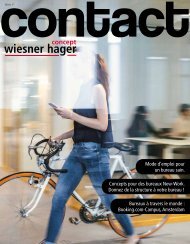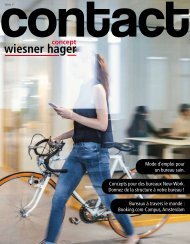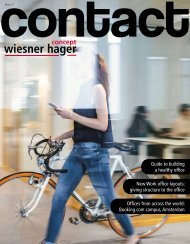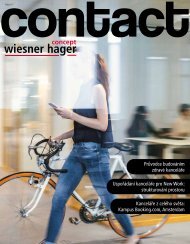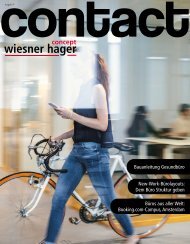contact_office_magazine_#38_EN
Welcome to the latest issue of contact – your trusty companion through the ever-evolving world of work. In this issue, we’re focusing on the topic of artificial intelligence and its influence on office working. Is AI nothing more than a nice assistant, or will it soon become a colleague?
Welcome to the latest issue of contact – your trusty companion through the ever-evolving world of work. In this issue, we’re focusing on the topic of artificial intelligence and its influence on office working. Is AI nothing more than a nice assistant, or will it soon become a colleague?
You also want an ePaper? Increase the reach of your titles
YUMPU automatically turns print PDFs into web optimized ePapers that Google loves.
Office Concepts<br />
4 <strong>contact</strong><br />
AI at the next desk?<br />
Artificial intelligence joins the team.<br />
{Hi ChatGPT! Please write an article about artificial intelligence in the modern working environment.}<br />
It probably would have taken us less than five minutes to enter this command into perhaps the world’s<br />
best-known generative AI tool and get an article about artificial intelligence and New Work back, ready<br />
to print. But is that really the future of the world of work? Where is AI going to be used, or perhaps<br />
even take over? What are the risks? And are we going to become something more akin to colleagues?<br />
Office workers sit in a room designed in a vintage style. Colourful elements can be seen all across the room. Each worker wears a<br />
futuristic helmet, creating a surreal contrast to the nostalgic aesthetic. They are working together on an AI project, a scenario that<br />
blurs the boundaries between the past and the future.<br />
AI research – the status quo.<br />
Almost all of us see the rapid development in the<br />
field of AI as something unfamiliar and unusual. Up<br />
to now, digital- and machine-based support in our<br />
working environments has been limited to assistance<br />
systems – the actual implementation and decisionmaking<br />
still left to us humans. Artificial intelligence<br />
systems, on the other hand,<br />
are becoming more and<br />
more far-reaching, working<br />
largely independently of us,<br />
and generally only requiring<br />
human intervention<br />
as the exception, rather<br />
than the rule. AI enables<br />
machines to imitate human<br />
cognitive abilities – such as<br />
logical thinking, learning<br />
and planning – by recognising<br />
and analysing the<br />
data it is fed and drawing<br />
conclusions from it. It is<br />
therefore not “intelligent” in a human sense, and cannot<br />
magically acquire a human level of understanding;<br />
the data AI works with is provided by humans,<br />
after all. At a base level, it’s all a matter of statistics.<br />
But where are we with AI research at the moment?<br />
Markus Manz and Lukas Fischer from the Software<br />
Competence Center Hagenberg know the answer.<br />
“Research in the field of artificial intelligence is<br />
diverse, dynamic, and revolutionising a huge range<br />
of sectors and roles, including pattern recognition,<br />
forecasting, selection processes, chatbots and medical<br />
technology. Deep learning and neural networks<br />
– both sub-domains of artificial intelligence<br />
– are dominating here. Advances<br />
in the neural network architectures<br />
have revolutionised some areas of<br />
application, such as image recognition<br />
and language processing. As<br />
well as exploring new opportunities,<br />
researchers are also concentrating on<br />
making AI systems more robust, reliable<br />
and adaptable”, says Manz.<br />
AI is particularly suited<br />
to tasks that are<br />
repeatable and require<br />
large volumes<br />
of data.”<br />
AI joins the team.<br />
What exactly does that mean for the world of work,<br />
and where can we make best use of artificial intelligence<br />
systems? “AI is particularly suited to tasks that<br />
are repeatable and require large volumes of data. Making<br />
decisions based on complex facts, and the ability<br />
to react to changes, are also areas where AI shines”,<br />
explains Fischer. But it’s not<br />
suited to every task. “Creativity,<br />
emotional intelligence<br />
and deep interpersonal<br />
communication are all areas<br />
where AI is (currently)<br />
lacking”, adds Fischer. If<br />
artificial intelligence is used<br />
to process complex data or<br />
perform repetitive, routine<br />
tasks, teamwork is essential<br />
– just as it is between<br />
human colleagues. “For<br />
humans and AI to develop<br />
a successful working<br />
relationship, there needs to be a clear assignment of<br />
roles, transparency, explainability, feedback loops,<br />
continuous learning, trust, and consideration of<br />
ethics and responsibility. If these basic principles<br />
and proven methods are adhered to, humans and AI<br />
can solve complex problems together”, says Manz,<br />
confidently.<br />
Dangers and risks.<br />
As much as AI can support and simplify our<br />
working lives, critics are constantly voicing their<br />
concerns about the dangers and risks. “There are<br />
clearly some potential dangers to be aware<br />
of when working with AI. Risks such as<br />
bias (stereotyping) and discrimination,<br />
loss of jobs and social inequality,<br />
security and data protection.<br />
There is also a potential loss<br />
of control, and many ethical<br />
questions. It’s already making<br />
our lives easier in some areas to<br />
such an extent that we could start<br />
to lose certain skills down the line”,<br />
warns Manz. The fear of losing jobs<br />
is a particularly hot topic right<br />
now. “It’s a justified concern, and<br />
the question needs to be asked.<br />
History shows that technological<br />
developments can lead to a<br />
loss of jobs in certain<br />
<strong>contact</strong> 5











